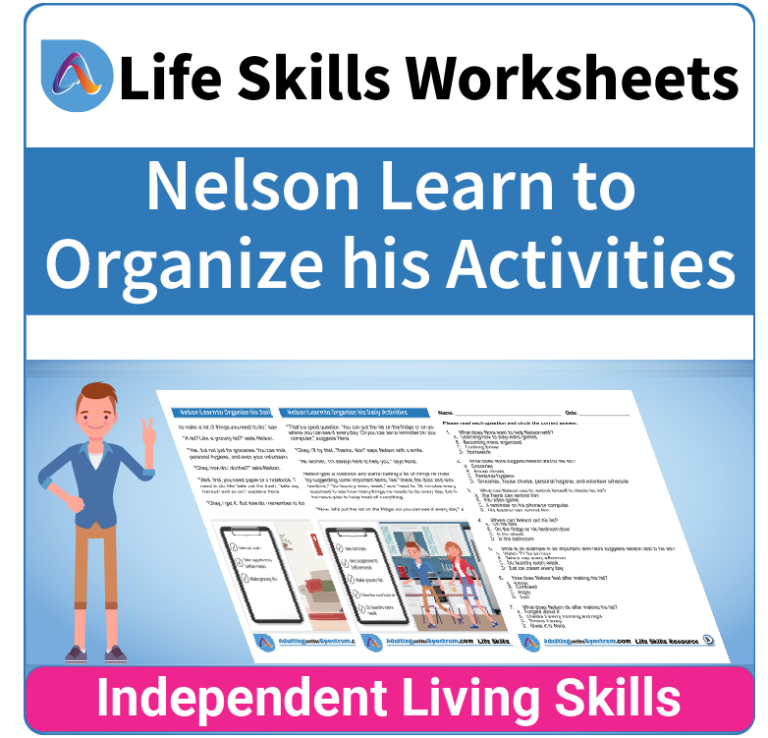The Importance of Routine for Teens and Adults with Autism
Imagine embarking on a journey to a place you’ve never been without a map or any familiar landmarks to guide you. Now, picture this scenario through the eyes of an adult with autism. For many, the world can be a perplexing and overwhelming place. In such a reality, routine becomes a steadfast anchor, providing stability, predictability, and a sense of security. Today, we’ll delve into the profound significance of routine for adults with autism, exploring how it impacts their daily lives, independence, and overall well-being.
The Foundation of Routine
Before we dive deeper into the importance of routine for adults with autism, it’s essential to understand the foundation on which routine is built. Autism, or Autism Spectrum Disorder (ASD), is characterized by a range of challenges related to communication, social interactions, repetitive behaviors, and sensory sensitivities. These challenges can make navigating the complexities of daily life more challenging.
Routine, in this context, is not merely about habit or convenience; it is a lifeline that provides structure and clarity in a world that may otherwise seem chaotic and confusing. It offers adults with autism a sense of order and predictability that can significantly enhance their overall quality of life.
Reducing Anxiety and Stress
Imagine waking up each day with no idea what the day will bring—no set schedule or familiar routines to follow. For adults with autism, unpredictability can be a significant source of anxiety and stress. Routine is a buffer against this anxiety, offering a clear path through the day’s challenges. Reducing anxiety and stress is not just about comfort; it’s about enabling adults with autism to function at their best. When anxiety is minimized, they are more likely to engage with the world, develop their skills, and live fulfilling lives.
Enhancing Communication
Effective communication can be challenging for individuals on the autism spectrum. Routine is vital in improving communication skills by providing a structured environment where individuals know what to expect. This predictability fosters a sense of security, which can encourage more open and effective communication. Consistent routines also create opportunities for adults with autism to practice and refine their communication skills in familiar settings, which can be applied to new or unfamiliar situations.
The Role of Routine in Adult Independent Living Skills
Adulting, with all its responsibilities and challenges, can be especially daunting for individuals with autism. Developing and maintaining independent living skills is critical to their journey to adulthood. Routine plays a fundamental role in this process, serving as a guide to navigate the intricacies of daily life.
Building Life Skills
Adulting life skills activities, such as budgeting, meal planning, and time management, can be overwhelming for anyone, let alone someone with autism. Routine simplifies the process of learning and practicing these skills by breaking them down into manageable, predictable steps. Consider the example of meal planning. Establishing a routine for grocery shopping, meal preparation, and cleanup can transform what might otherwise be a chaotic and daunting task into a structured and manageable process.
Encouraging Independence
Routine empowers adults with autism to take charge of their lives. They can gradually assume more independence and responsibility when establishing routines for essential tasks. This independence is empowering and vital for their self-esteem and overall well-being.
Reducing Sensory Overload
Sensory sensitivities are common among individuals with autism, and routine can be a powerful tool for managing sensory overload. By incorporating sensory-friendly elements into daily routines, such as noise-canceling headphones or designated quiet times, adults with autism can better regulate their sensory experiences.
Routine-Based Strategies for Success
Now that we’ve explored routine’s profound impact let’s delve into practical strategies for incorporating a routine into the lives of adults with autism.
Visual Schedules
Visual schedules are highly effective tools for individuals with autism. These schedules outline daily activities and routines using visual cues, such as pictures, symbols, or written instructions. Visual schedules provide a clear and tangible way for adults with autism to understand and follow their routines. Visual schedules can be created using paper-based charts, digital apps, or a combination of both. The key is to tailor the visual schedule to the individual’s needs and preferences.
Consistent Daily Routines
Establishing consistent daily routines is essential. Wake-up times, meal times, work or school schedules, and bedtime routines should follow a predictable pattern. Consistency reduces anxiety and helps adults with autism anticipate transitions between activities.
Transition Strategies
Transitions can be challenging for individuals with autism, as they involve shifting from one routine or activity to another. Use strategies like visual countdown timers, transition warnings, or transition objects to ease these transitions. These tools provide a sense of predictability and help individuals prepare mentally for the upcoming change.
Social Stories
Social stories are narrative tools that use simple language and visual cues to explain social situations, routines, or expected behaviors. They are beneficial for individuals with autism to understand and navigate various social and routine-related scenarios. For example, a social story can be created to illustrate the grocery shopping process, including steps like making a list, driving to the store, selecting items, and paying at the checkout. Social stories provide clarity and reduce anxiety by outlining what to expect.
Sensory-Friendly Environments
Incorporate sensory-friendly elements into living spaces to create a calming and comfortable environment. This may include using soft lighting, providing sensory tools or toys, or designating quiet spaces where individuals can retreat when sensory sensitivities become overwhelming.
Parenting Tips for Autism: Supporting Routine Development
Parents and caregivers play a crucial role in supporting the development and maintenance of routines for adults with autism. Here are some parenting tips for autism that can help:
Be Patient and Flexible
While routines offer stability, it’s essential to be flexible and responsive to individual needs. Understand that some days may require adjustments to the routine based on factors like sensory sensitivities or unexpected events.
Collaborate and Communicate
Involve the individual with autism in developing and modifying their routines whenever possible. Encourage open communication to understand their preferences, needs, and challenges.
Seek Professional Guidance
Consult with professionals specializing in autism for guidance on developing effective routines tailored to the individual’s unique strengths and challenges.
Celebrate Successes
Acknowledge and celebrate milestones and achievements related to routines. Positive reinforcement can be a powerful motivator for adults with autism to continue building and maintaining routines.
The Empowering Journey
The importance of routine for adults with autism cannot be overstated. It serves as a guiding force, offering stability, predictability, and security in an often bewildering world. As parents, caregivers, and supporters, we have the privilege of witnessing the empowering journey of individuals with autism as they navigate life’s challenges with the aid of routines.
Let us continue to champion the importance of routine, recognizing its transformative power in the lives of adults with autism. By doing so, we contribute to a more inclusive and supportive world where individuals on the autism spectrum can thrive, achieve their goals, and lead lives filled with purpose and fulfillment.






